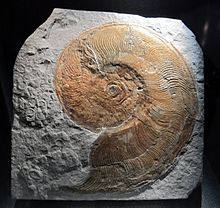Hildoceratoidea, formerly Hildoceratacaea, is a superfamily of compressed or planulate ammonites, some tending to develop acute outer rims; generally with arcuate or sigmoidal ribs. Aptichus were found in place are double-valved.[3]
| Hildoceratoidea Temporal range: Early—Middle Jurassic,
| |
|---|---|

| |
| Harpoceras exaratum | |
| Scientific classification | |
| Domain: | Eukaryota |
| Kingdom: | Animalia |
| Phylum: | Mollusca |
| Class: | Cephalopoda |
| Subclass: | †Ammonoidea |
| Order: | †Ammonitida |
| Suborder: | †Ammonitina |
| Superfamily: | †Hildoceratoidea Hyatt, 1867 |
| Families[2] | |
Hildoceratoidea is an upper Lower to lower Middle Jurassic group belonging to the Ammonitina that unites the Hildoceratidae, Hammatoceratidae, Graphoceratidae, and Sonniniidae.[3] In some taxonomies the name Phymatoceratidae is substituted for the Hammatoceratidae[4]
Hildoceratidae, which is the ancestral family, is derived from the Acanthopleuroceratinae, a subfamily in the Eoderoceratoidean family, Polyorphitidae. The Stephanoceratoidea, Perisphinctoidea, and Haploceratoidea have their source in the Hammatoceratidae which is derived from the Hildoceratidae.[3]

References
edit- ^ Kovács, Z.; Géczy, B. (2008). "Upper Toarcian – Middle Aalenian (Jurassic) Erycitinae SPATH (Ammonitina) from the Gerecse Mts, Hungary" (PDF). 125th Anniversary of the Department of Palaeontology at Budapest University – A Jubilee Volume Hantkeniana. 6: 57–108. Archived from the original (PDF) on 2011-07-16. Retrieved 2010-11-25.
- ^ "Paleobiology Database - Hildoceratoidea". Retrieved 2017-10-19.
- ^ a b c Arkell et al., Treatise on Invertebrate Paleontology, Part L Ammonoidea, (1956)
- ^ Taxonomicon (Hildocerataceae)|